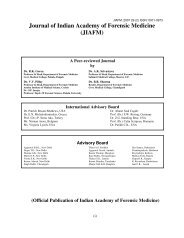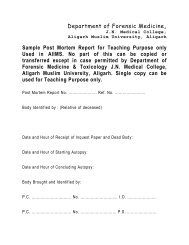Download - forensic medicine
Download - forensic medicine
Download - forensic medicine
You also want an ePaper? Increase the reach of your titles
YUMPU automatically turns print PDFs into web optimized ePapers that Google loves.
JIAFM, 2007 - 29(4); ISSN: 0971-0973<br />
enquiry conducted by the Additional District Judge,<br />
directed the CBI to lodge a FIR and initiate criminal<br />
proceedings against all persons named in the report.<br />
Directorate of Enforcement was also directed to pay<br />
a sum of Rs.2 lakh to the widow of the deceased by<br />
way of ex gratia payment at the interim stage.<br />
Our experience derived through the cases<br />
conducted at the institute during the preceding ten<br />
years shows that deaths in custody may broadly be<br />
categorized in two groups, viz: i) death due to or<br />
precipitated by medical condition under peculiar<br />
circumstances, and (ii) death due to another<br />
person’s action/behavior including those occasioned<br />
from police torture in custody or during restraint or<br />
after release from the custody (when death could<br />
reasonably be traced to effects of injuries). Majority<br />
of cases were due to or somehow related to medical<br />
condition and our results stand substantiated by the<br />
literature available on the subject. However, the<br />
literature often speaks of a third category also<br />
wherein death is attributed to deceased‘s own<br />
causal actions i.e. self-harm (deliberate or<br />
circumstantially triggered).<br />
In all these cases the inquest proceedings had been<br />
conducted by the executive magistrate as<br />
contemplated in section 176 of the CrPC.[11] This<br />
section is designed to provide a check on the<br />
working of the police or to calm any alarm that has<br />
been created in the mind of the public in cases of<br />
death occurring under some specific circumstances.<br />
A recent amendment in the said section requires the<br />
inquest proceedings to be conducted by a judicial<br />
magistrate. The amendment (effective from<br />
23.06.2006) provides that “in case of death or<br />
disappearance of a person or rape of a woman while<br />
in the custody of the police, there shall be a<br />
mandatory judicial inquiry and in case of death,<br />
examination of the dead body shall be conducted<br />
within 24 hours of death”. It is worth focusing here<br />
that in the light of this amendment; the Hon’ble High<br />
Court took objection to the inquiry proceedings<br />
having been conducted by an SDM rather than by a<br />
judicial magistrate in the case of custodial death of<br />
Anil Kumar mentioned earlier.[9]<br />
As far as the issue of compensation is concerned,<br />
Article 9(5) of the International Covenant on Civil<br />
and Political Rights 1966 (ICCPR) provides that<br />
“anyone who has been the victim of unlawful arrest<br />
or detention shall have enforceable right to<br />
compensation”. However, India expressed specific<br />
reservation to the effect that Indian Legal System did<br />
not recognize a right to compensation for victims of<br />
unlawful arrest or detention and thus did not become<br />
a party to the Covenant. Notwithstanding all this,<br />
the Apex Court through judicial activism evolved a<br />
right to compensation in cases of established<br />
unconstitutional deprivation of personal liberty or life.<br />
The ‘Bhagalpur blinding case [12] was the first case<br />
where the question of monetary compensation was<br />
considered by the Hon’ble Supreme Court. The<br />
working principles for calculating the quantum of the<br />
compensation was laid down in another case [13]<br />
from Bihar. In 1994, the Hon’ble Supreme Court<br />
introduced the concept of “personal liability”[14]<br />
wherein the State could recover the compensation<br />
paid to the victim or his family from the official<br />
concerned, as a deterrent to the said officers<br />
indulging in the atrocities.<br />
It has been furthered that this compensation was<br />
based on strict liability and was recoverable from the<br />
State, which shall have the right to be indemnified by<br />
the wrongdoer. It was observed that the objective<br />
was to apply balm to the wounds and not to punish<br />
the transgressor or the offender, as awarding<br />
appropriate punishment for the offence (irrespective<br />
of the compensation) must be left to the criminal<br />
courts in which the offender is prosecuted, which the<br />
State was duty-bound to do under the law. Amongst<br />
the judgments of other countries cited by the Apex<br />
Court in this context, the judgment of the Court of<br />
Appeal of Newzeland in Simpson Case [15]<br />
deserves mention wherein the issue had been dealt<br />
in a very elaborate manner. Each of the five<br />
members of the Court of Appeal delivered a<br />
separate judgment but there was unanimity of<br />
opinion regarding the grant of pecuniary<br />
compensation to the victim, for the contravention of<br />
his rights guaranteed under the Bill of Rights Act,<br />
notwithstanding the absence of an express provision<br />
in that behalf.<br />
Conclusion:<br />
The Hon’ble Supreme Court laid down in DK Basu’s<br />
case [16] the guidelines to be followed in all cases of<br />
arrest or detention to combat the evil of custodial<br />
crime and bring transparency and accountability<br />
therein. However most of the recommendations<br />
made by the Hon’ble courts or the various NGOs<br />
from time to time are only observed more in the<br />
breach and not adhered to. Though most of the rules<br />
and instructions regarding the prohibition of torture<br />
are incorporated in the curriculum of training of the<br />
police force, the basic mind-set has not changed.<br />
Hence the need of the hour is to put in serious<br />
thinking and concerted efforts by all concerned—the<br />
State, the voluntary organizations, the society, etc<br />
so as to bring in the needed change in the attitude of<br />
the custodians of law.<br />
127


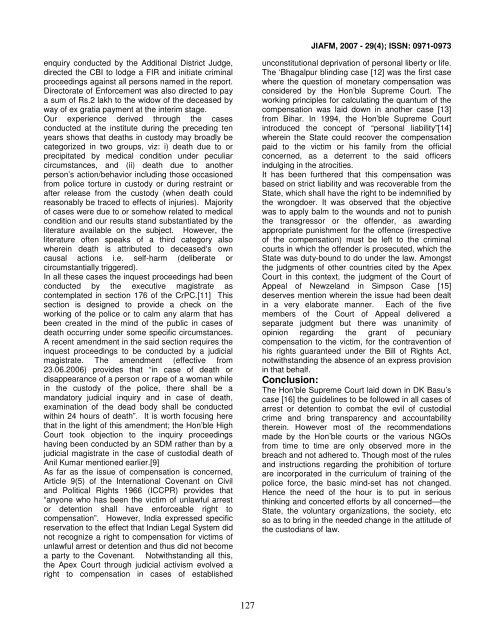
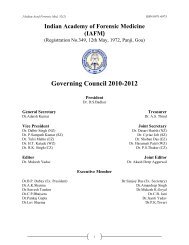
![syllabus in forensic medicine for m.b.b.s. students in india [pdf]](https://img.yumpu.com/48405011/1/190x245/syllabus-in-forensic-medicine-for-mbbs-students-in-india-pdf.jpg?quality=85)
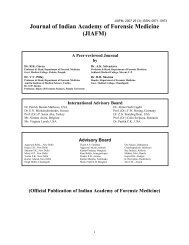
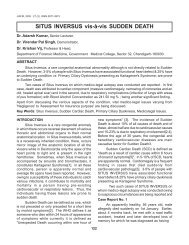
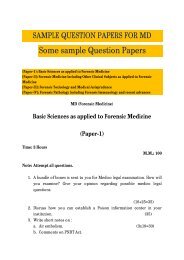
![SPOTTING IN FORENSIC MEDICINE [pdf]](https://img.yumpu.com/45856557/1/190x245/spotting-in-forensic-medicine-pdf.jpg?quality=85)
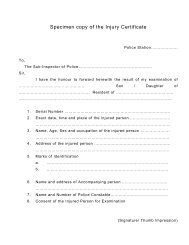
![JAFM-33-2, April-June, 2011 [PDF] - forensic medicine](https://img.yumpu.com/43461356/1/190x245/jafm-33-2-april-june-2011-pdf-forensic-medicine.jpg?quality=85)
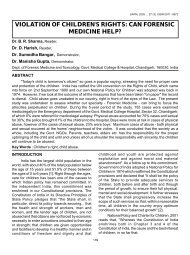
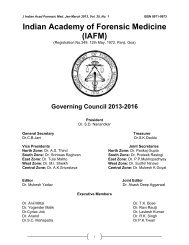
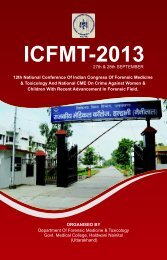
![JIAFM-33-4, October-December, 2011 [PDF] - forensic medicine](https://img.yumpu.com/31013278/1/190x245/jiafm-33-4-october-december-2011-pdf-forensic-medicine.jpg?quality=85)
